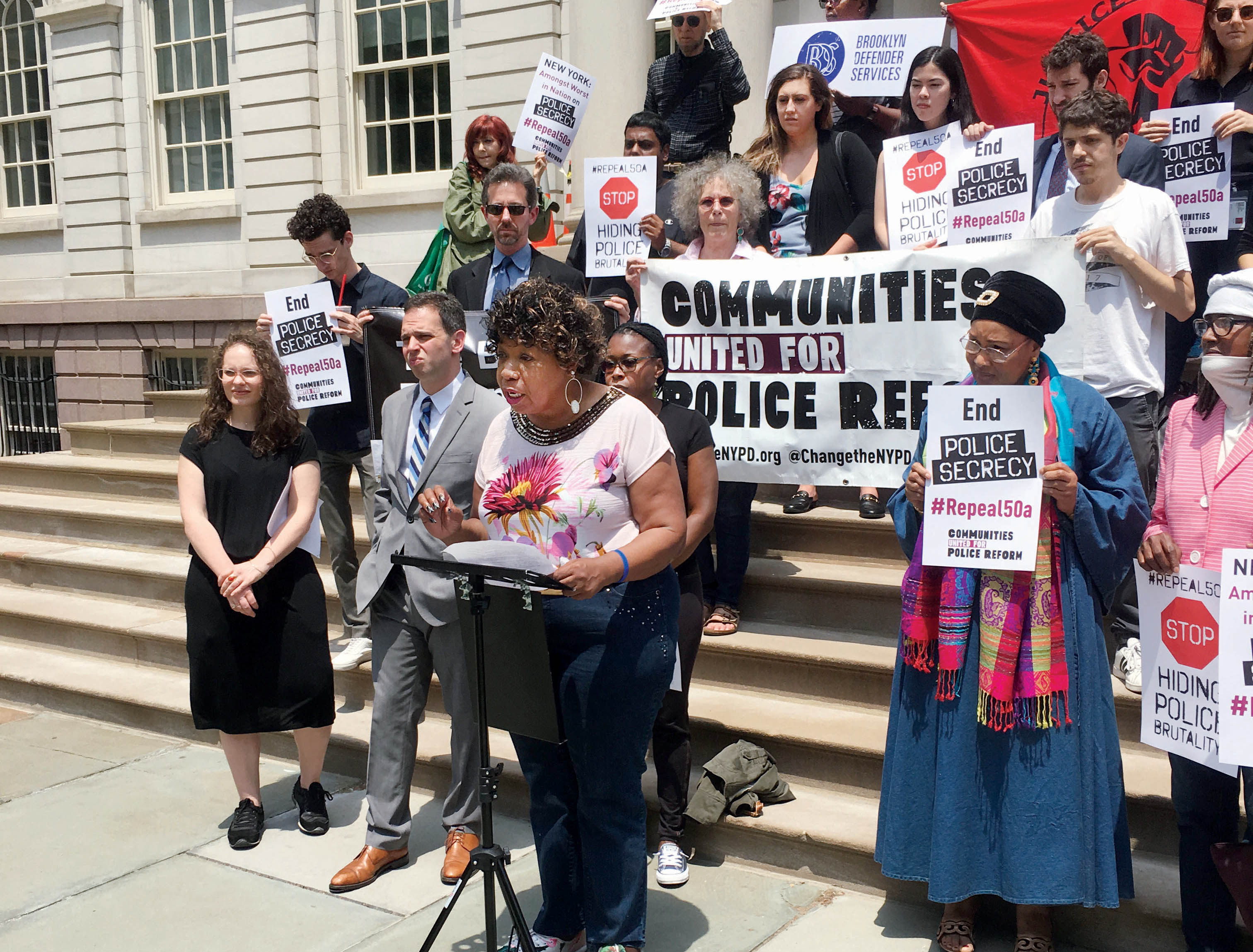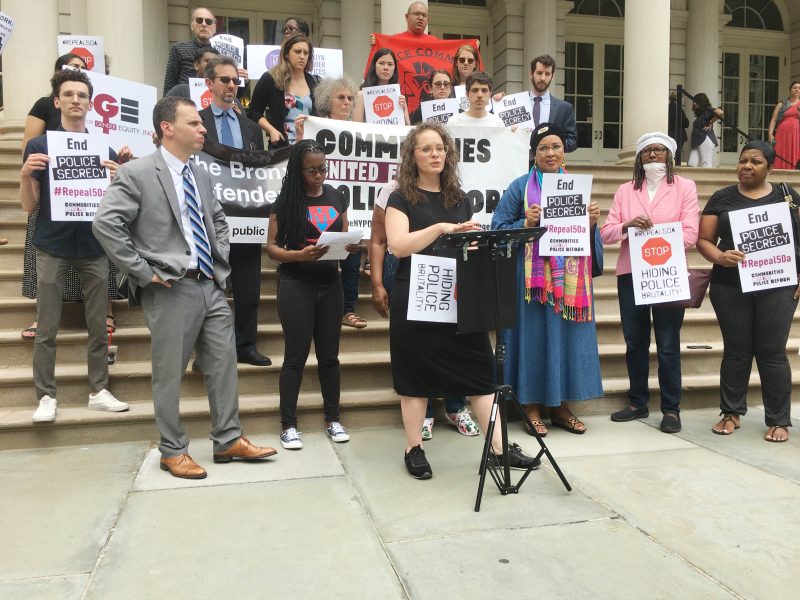As Law to Open Police Records Is Debated, Tribunal Denies Bid to Shield Info
An administrative law judge said a controversial law allowing law enforcement agencies to keep disciplinary records secret, a law whose repeal is a current front-burner topic in the New York Legislature, can't be used to shroud any mention of the disciplinary matter.
June 08, 2018 at 05:58 PM
4 minute read
 The union representing New York City's corrections officers is challenging a Manhattan judge's refusal to keep under seal information about an officer's write-up for excessive force. The administrative law judge said a controversial law allowing law enforcement agencies to keep disciplinary records secret, a law whose repeal is a current front-burner topic in the New York Legislature, can't be used to shroud any mention of the disciplinary matter. Administrative Law Judge Faye Lewis denied a request by Aubrey Victor, a corrections officer on Rikers Island who was fired for using excessive force on an inmate, to redact his name from court documents on his case. administrative tribunal ruling It also comes as legislation to repeal the 40-year-old statute, which was relatively obscure until Eric Garner died in 2014 on Staten Island while New York City Police Officer Daniel Pantaleo had him in a choke hold, languishes in the State Assembly in the face of stiff opposition from police unions as this year's legislative session enters its final days.
The union representing New York City's corrections officers is challenging a Manhattan judge's refusal to keep under seal information about an officer's write-up for excessive force. The administrative law judge said a controversial law allowing law enforcement agencies to keep disciplinary records secret, a law whose repeal is a current front-burner topic in the New York Legislature, can't be used to shroud any mention of the disciplinary matter. Administrative Law Judge Faye Lewis denied a request by Aubrey Victor, a corrections officer on Rikers Island who was fired for using excessive force on an inmate, to redact his name from court documents on his case. administrative tribunal ruling It also comes as legislation to repeal the 40-year-old statute, which was relatively obscure until Eric Garner died in 2014 on Staten Island while New York City Police Officer Daniel Pantaleo had him in a choke hold, languishes in the State Assembly in the face of stiff opposition from police unions as this year's legislative session enters its final days.  According to the 2015 decision by the Office of Administrative Trials and Hearings to affirm Victor's 2011 termination, Victor punched a 16-year-old inmate in the face without provocation and stomped on his head three times while he lay on the ground. For his part, Victor testified that he believed the inmate had a weapon, but Lewis said in a signed decision she found Victor's version of the facts “incredible.” In the course of his proceedings before the OATH tribunal, the court denied Victor's motion to redact his name and other identifying information from any OATH report or recommendation regarding his case, citing 50-a. But Faye wrote that the administrative court was established by the City Charter as an independent tribunal and its decisions are not under the control of the Department of Correction. Thus, the judge said, it is not bound by 50-a. On May 29, Manhattan Supreme Court Justice Shlomo Hagler dismissed Victor's Article 78 petition to challenge OATH's ruling, and also denied his request to make confidential all OATH decisions regarding corrections officers dating back to 1992, saying the “unfettered, unlimited” request to shroud 35 years of OATH jurisprudence would likely be time-barred. The New York Times and the New York Civil Liberties Union filed amicus briefs in the case arguing that corrections officers' disciplinary records should be public. “The effort here to use section 50-a not only to bar release of current disciplinary decisions but also to scrub decades of past decisions from the public realm reveals just how far law enforcement will go in trying to use section 50-a to block transparency and accountability,” said Christopher Dunn, the NYCLU's associate legal director. “While confident that Justice Hagler's ruling will be upheld, we remain deeply concerned about the breadth of the statute.” sided with the police union a growing list of groups have The report created a dustup between the City Bar and the police union, which called the report “tainted” because its signatories, Philip Desgranges of the NYCLU and Cynthia Conti-Cook of the Legal Aid Society, work for organizations representing parties challenging the courts' interpretations 50-a. State Assemblyman Daniel O'Donnell, a Manhattan Democrat, has proposed a bill that would repeal 50-a, but the bill hasn't moved since it was sent to a committee in January. Assemblyman Dan Quart, also a Manhattan Democrat and a co-sponsor of the bill who spoke on Friday at a rally on the steps of City Hall to call for the repeal of the law, said he has “zero” confidence that the legislation will pass when the session ends this month. “It's frustrating because no issue is as clear-cut as this one is,” Quart said.
According to the 2015 decision by the Office of Administrative Trials and Hearings to affirm Victor's 2011 termination, Victor punched a 16-year-old inmate in the face without provocation and stomped on his head three times while he lay on the ground. For his part, Victor testified that he believed the inmate had a weapon, but Lewis said in a signed decision she found Victor's version of the facts “incredible.” In the course of his proceedings before the OATH tribunal, the court denied Victor's motion to redact his name and other identifying information from any OATH report or recommendation regarding his case, citing 50-a. But Faye wrote that the administrative court was established by the City Charter as an independent tribunal and its decisions are not under the control of the Department of Correction. Thus, the judge said, it is not bound by 50-a. On May 29, Manhattan Supreme Court Justice Shlomo Hagler dismissed Victor's Article 78 petition to challenge OATH's ruling, and also denied his request to make confidential all OATH decisions regarding corrections officers dating back to 1992, saying the “unfettered, unlimited” request to shroud 35 years of OATH jurisprudence would likely be time-barred. The New York Times and the New York Civil Liberties Union filed amicus briefs in the case arguing that corrections officers' disciplinary records should be public. “The effort here to use section 50-a not only to bar release of current disciplinary decisions but also to scrub decades of past decisions from the public realm reveals just how far law enforcement will go in trying to use section 50-a to block transparency and accountability,” said Christopher Dunn, the NYCLU's associate legal director. “While confident that Justice Hagler's ruling will be upheld, we remain deeply concerned about the breadth of the statute.” sided with the police union a growing list of groups have The report created a dustup between the City Bar and the police union, which called the report “tainted” because its signatories, Philip Desgranges of the NYCLU and Cynthia Conti-Cook of the Legal Aid Society, work for organizations representing parties challenging the courts' interpretations 50-a. State Assemblyman Daniel O'Donnell, a Manhattan Democrat, has proposed a bill that would repeal 50-a, but the bill hasn't moved since it was sent to a committee in January. Assemblyman Dan Quart, also a Manhattan Democrat and a co-sponsor of the bill who spoke on Friday at a rally on the steps of City Hall to call for the repeal of the law, said he has “zero” confidence that the legislation will pass when the session ends this month. “It's frustrating because no issue is as clear-cut as this one is,” Quart said.This content has been archived. It is available through our partners, LexisNexis® and Bloomberg Law.
To view this content, please continue to their sites.
Not a Lexis Subscriber?
Subscribe Now
Not a Bloomberg Law Subscriber?
Subscribe Now
NOT FOR REPRINT
© 2025 ALM Global, LLC, All Rights Reserved. Request academic re-use from www.copyright.com. All other uses, submit a request to [email protected]. For more information visit Asset & Logo Licensing.
You Might Like
View All
Justice 'Weaponization Working Group' Will Examine Officials Who Investigated Trump, US AG Bondi Says

Lawyers Across Political Spectrum Launch Public Interest Team to Litigate Against Antisemitism
4 minute read
'Landmark' New York Commission Set to Study Overburdened, Under-Resourced Family Courts

Trending Stories
- 1Exceptional Growth Becoming the Rule? Demand and Rate Hikes Drove Strong Year for Big Law
- 2Dentons Taps D.C. Capital Markets Attorney for New US Managing Partner
- 3Auto Dealers Ask Court to Pump the Brakes on Scout Motors’ Florida Sales
- 4German Court Orders X to Release Data Amid Election Interference Concerns
- 5Litigation Trends to Watch From Law.com Radar: Suits Strike at DEI Policies, 'Meme Coins' and Infractions in Cannabis Labeling
Who Got The Work
J. Brugh Lower of Gibbons has entered an appearance for industrial equipment supplier Devco Corporation in a pending trademark infringement lawsuit. The suit, accusing the defendant of selling knock-off Graco products, was filed Dec. 18 in New Jersey District Court by Rivkin Radler on behalf of Graco Inc. and Graco Minnesota. The case, assigned to U.S. District Judge Zahid N. Quraishi, is 3:24-cv-11294, Graco Inc. et al v. Devco Corporation.
Who Got The Work
Rebecca Maller-Stein and Kent A. Yalowitz of Arnold & Porter Kaye Scholer have entered their appearances for Hanaco Venture Capital and its executives, Lior Prosor and David Frankel, in a pending securities lawsuit. The action, filed on Dec. 24 in New York Southern District Court by Zell, Aron & Co. on behalf of Goldeneye Advisors, accuses the defendants of negligently and fraudulently managing the plaintiff's $1 million investment. The case, assigned to U.S. District Judge Vernon S. Broderick, is 1:24-cv-09918, Goldeneye Advisors, LLC v. Hanaco Venture Capital, Ltd. et al.
Who Got The Work
Attorneys from A&O Shearman has stepped in as defense counsel for Toronto-Dominion Bank and other defendants in a pending securities class action. The suit, filed Dec. 11 in New York Southern District Court by Bleichmar Fonti & Auld, accuses the defendants of concealing the bank's 'pervasive' deficiencies in regards to its compliance with the Bank Secrecy Act and the quality of its anti-money laundering controls. The case, assigned to U.S. District Judge Arun Subramanian, is 1:24-cv-09445, Gonzalez v. The Toronto-Dominion Bank et al.
Who Got The Work
Crown Castle International, a Pennsylvania company providing shared communications infrastructure, has turned to Luke D. Wolf of Gordon Rees Scully Mansukhani to fend off a pending breach-of-contract lawsuit. The court action, filed Nov. 25 in Michigan Eastern District Court by Hooper Hathaway PC on behalf of The Town Residences LLC, accuses Crown Castle of failing to transfer approximately $30,000 in utility payments from T-Mobile in breach of a roof-top lease and assignment agreement. The case, assigned to U.S. District Judge Susan K. Declercq, is 2:24-cv-13131, The Town Residences LLC v. T-Mobile US, Inc. et al.
Who Got The Work
Wilfred P. Coronato and Daniel M. Schwartz of McCarter & English have stepped in as defense counsel to Electrolux Home Products Inc. in a pending product liability lawsuit. The court action, filed Nov. 26 in New York Eastern District Court by Poulos Lopiccolo PC and Nagel Rice LLP on behalf of David Stern, alleges that the defendant's refrigerators’ drawers and shelving repeatedly break and fall apart within months after purchase. The case, assigned to U.S. District Judge Joan M. Azrack, is 2:24-cv-08204, Stern v. Electrolux Home Products, Inc.
Featured Firms
Law Offices of Gary Martin Hays & Associates, P.C.
(470) 294-1674
Law Offices of Mark E. Salomone
(857) 444-6468
Smith & Hassler
(713) 739-1250






